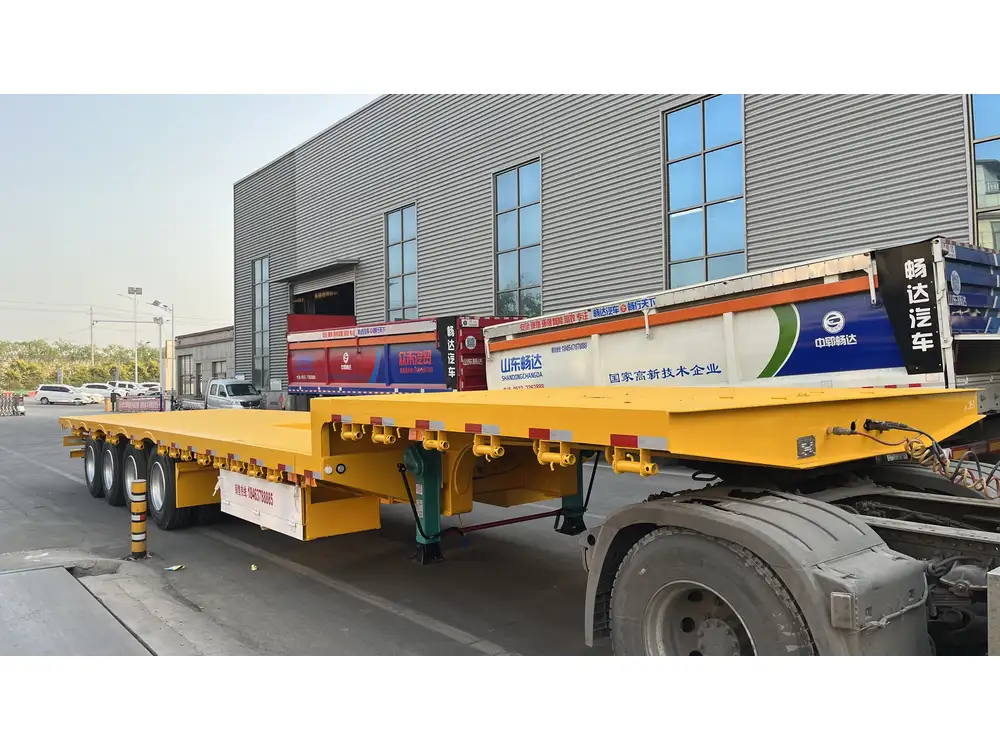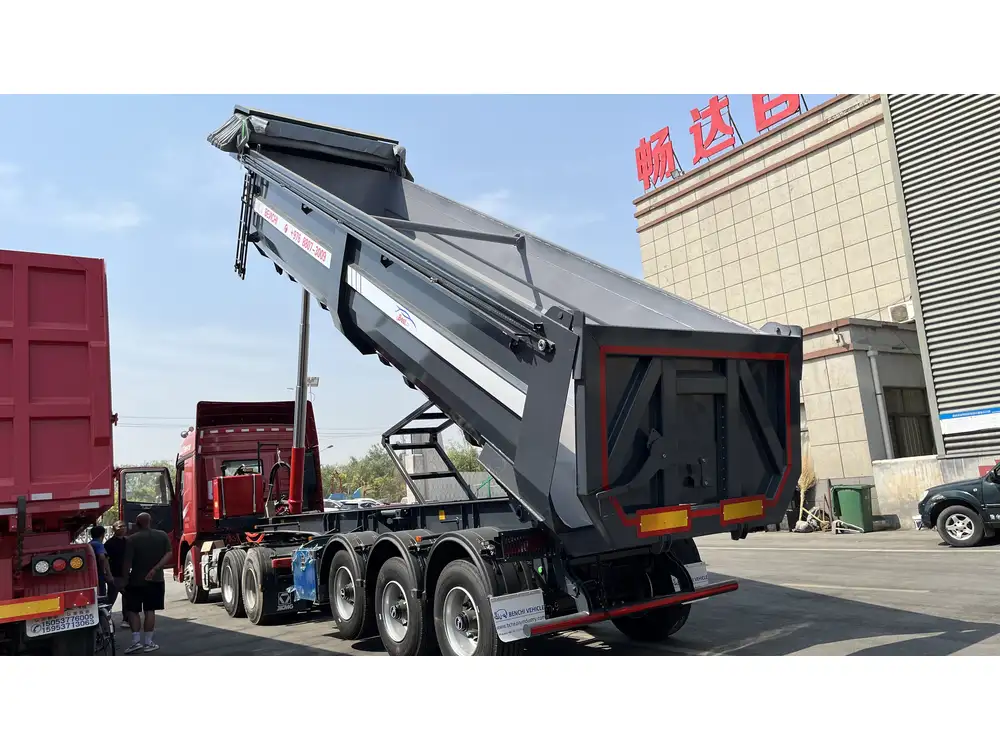Understanding and addressing issues related to semi-trailers is paramount to maintaining a seamless operation in the logistics and transportation industry. Among the myriad challenges faced by operators, the issue of a stuck pin—often referred to as a fifth wheel pin—is one of the most perplexing and frustrating. In this comprehensive guide, we will delve into the reasons why the pin of a semi-trailer may become stuck, explore troubleshooting methods, and offer optimal solutions to prevent future occurrences.
Understanding the Fifth Wheel System
1. What is a Fifth Wheel?
The fifth wheel is a critical component of the semi-trailer setup. It serves as the coupling mechanism that allows the trailer to be attached to the tractor unit. The pin is integral to this system, allowing for a secure connection that enables the safe transport of goods.

2. Components of the Fifth Wheel System
Here’s a breakdown of the essential parts of a fifth wheel system that work together:
| Component | Function |
|---|---|
| Fifth Wheel Base | Attaches to the chassis of the truck. |
| Jaw Assembly | Locks the pin and secures the trailer connection. |
| Release Handle | Allows the operator to disengage the trailer. |
| Slide Mechanism | Enables adjustment for weight distribution. |
3. Importance of Proper Maintenance
Regular maintenance is critical to ensure optimal operation of the fifth wheel system. Components should be inspected and lubricated periodically to prevent wear and tear.
Reasons for a Stuck Pin in Semi-Trailers

1. Lack of Lubrication
The most common reason for a stuck pin is inadequate lubrication. Over time, dirt and debris can accumulate, creating friction between the pin and the jaw assembly.
- Indicators: Difficulty in coupling or uncoupling, visible rust or dirt buildup.
- Solution: Regularly apply grease and inspect the components for signs of dirt. Use a grease gun on lubrication fittings.
2. Misalignment of the Fifth Wheel
Improper alignment between the semi-trailer and the tractor can lead to excessive stress on the pin mechanism.
- Indicators: Uneven trailer height or skewed trailer.
- Solution: Align the trailer with the tractor, ensuring the fifth wheel is level. Adjust the fifth wheel height as needed.
3. Wear and Tear of Components
With time and heavy usage, components of the fifth wheel can exhibit wear, leading to operational difficulties.
- Indicators: Visible wear on the pin, jaw assembly, or release mechanism.
- Solution: Replace worn-out components immediately to prevent further issues.

4. Environmental Factors
External conditions, such as extreme weather, can also impact the functionality of the pin. For instance, moisture can lead to corrosion.
- Indicators: Stiff or rusty pin, difficulty in the release handle movement.
- Solution: Invest in protective covers and park in sheltered areas when feasible.
5. Incorrect Usage or Overloading
Overloading a semi-trailer beyond its rated capacity can place undue stress on the coupling components.
- Indicators: Bending of the pin or other components.
- Solution: Adhere to manufacturer guidelines regarding loading capacities. Regularly inspect load distribution on the trailer.
Troubleshooting a Stuck Pin

Step-by-Step Troubleshooting
Initiate a Visual Inspection
- Look for Obstruction: Check for any debris around the pin or jaw assembly.
- Check for Damage: Inspect components for any signs of wear, cracking, or deformation.
Assess the Lubrication Levels
- Examine Grease Points: Ensure all lubrication points are adequately serviced.
- Add Lubricant: Use high-quality grease to alleviate friction points.
Attempt Manual Release
- Check the Release Handle: If it’s stuck, apply gentle force and wiggle it back and forth.
- Use a Mallet: Carefully tap the release lever with a rubber mallet to dislodge stuck components.
Align and Reposition the Trailer
- Re-position the Truck: Back the tractor slightly to relieve tension from the pin.
- Check Height Alignment: Ensure the fifth wheel matches the trailer height specifications.
Utilize Heat Sparingly
- Heat Application: In cases of severe rust or corrosion, applying controlled heat with a blowtorch might help; however, use caution to avoid damaging components.
Seek Professional Help
- If these methods do not yield results, it is advisable to contact a technician who specializes in semi-trailer repairs.
Preventive Measures
Regular Maintenance Routines
To ensure the longevity and functionality of your semi-trailer’s fifth wheel system, adopting a proactive maintenance routine is essential. Here are several effective strategies:
| Maintenance Task | Frequency | Purpose |
|---|---|---|
| Lubrication | Monthly | Reduces friction, prevents rust. |
| Visual Inspections | Monthly | Identifies wear, tear, and other issues. |
| Component Replacement | Annually | Ensures all parts are functioning correctly. |
| Load Balance Checks | Before each trip | Prevents overloading and skewed performance. |
| Alignment Checks | Bi-annually | Maintains proper connection between tractor & trailer. |

Proper Training of Operators
Enhancing the knowledge of drivers and operators regarding the importance of coupling mechanics can lead to safer and more efficient operations. Providing training on:
- Correct coupling practices.
- Load distribution fundamentals.
- The significance of regular inspections and maintenance.
Use of Advanced Technologies
Integrating technology such as automated braking systems, anti-rollover devices, and electronic stability control can add layers of safety and efficiency, thereby reducing the risk of mechanical failures.
Frequently Asked Questions (FAQs)

Why Is My Semi-Trailer Pin Stuck After a Heavy Rain?
Heavy rain can introduce moisture into the fifth wheel mechanism, leading to rust formation. This can inhibit the natural movement of the pin and jaw assembly, causing it to become stuck.
How Can I Tell If My Fifth Wheel Needs Replacement?
If you notice significant wear on the lock jaw, persistent difficulties in coupling, or if the release mechanism feels loose or unresponsive, it might be time for a replacement.
What Lubricant Should I Use for My Fifth Wheel?
Always opt for a high-quality, heavy-duty grease that is designed for high-temperature and high-impact applications. Check your manufacturer specifications for recommendations.

How Often Should I Check My Semi-Trailer’s Fifth Wheel?
Monthly inspections are ideal, but if the trailer is in regular use, consider bi-weekly checks to ensure everything operates smoothly.
Conclusion
Dealing with a stuck pin in a semi-trailer can be a significant inconvenience, but with a thorough understanding of the mechanisms involved and proper preventative measures, it’s a challenge that can be easily managed. We have explored various causes of a stuck pin and detailed effective troubleshooting and maintenance strategies. By prioritizing regular checks, operator training, and technological integration, we can maintain high operational standards and ensure safety in our transportation operations.
The road ahead need not be fraught with unexpected issues, but rather a path of efficiency and seamless logistics. Equip your team with the knowledge and tools they need to tackle these challenges head-on, and keep your semi-trailer operating at its best!



